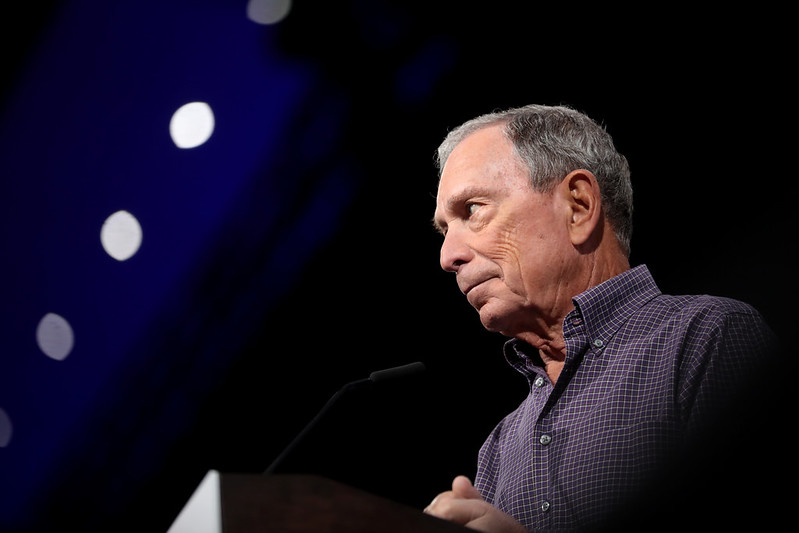The first effect of Michael Bloomberg’s campaign and of his conflicts of interest is to reduce the 2020 candidates’ accountability: one of the world’s largest media corporations will stop investigating presidential candidates.

On its corporate website, Bloomberg Media claims to be “the largest global business media company in existence today, reaching a premium audience of 62 million across our multiple platforms: digital, TV, radio, print and live events.” Michael Bloomberg’s run for president is, therefore, a global media problem because of the conflict of interest it creates.
Bloomberg L. P. is a private company. Its founder, Michael Bloomberg, has a majority stake in the company and has returned to run the company after the end of his term as New York mayor in 2008. After his official decision to run in the Democratic Party’s primaries, Bloomberg Media’s editor-in-chief, John Micklethwait, released an unprecedented statement to explain how the newsroom would address the conflict of interest involved in covering the owner of the group.
The statement makes clear why there is no safe way to deal with media moguls when they decide to take on politics: If they do not immediately get rid of their shares, the quality of the public debate will be seriously harmed, as will democracy’s fairness.
“No previous presidential candidate has owned a journalistic organization of this size,” Micklethwait acknowledges in his statement. However, his “basic principles” for dealing with this problem are surprising.
First, he will suspend the Editorial Board of Bloomberg Opinion, the opinion-only website separate from the news branch. The reason for the suspension is that many members of the board will join Bloomberg’s campaign. Micklethwait says that Bloomberg Opinion was “the place where Mike has had the most contact with Editorial: our editorials have reflected his views.” This is not a trivial statement for an editor-in-chief: Usually, top journalists will at least pretend to be independent of their publishers, even when that claim seems difficult to sustain. Micklethwait has no shame admitting that his publication’s unsigned editorials were, actually, “Mike’s” personal opinion. Columnists will continue to “speak for themselves,” but Bloomberg Opinion will not publish “op-ed articles that relate to or are affiliated with any candidate or any presidential campaign, including Mike’s.”

The publisher’s conflict of interest will have an impact on Bloomberg’s news coverage as well, not just its opinion section. “We will continue our tradition of not investigating Mike (and his family and foundation) and we will extend the same policy to his rivals in the Democratic primaries. We cannot treat Mike’s Democratic competitors differently from him.” Fair enough. What about Donald Trump, though? Why should Bloomberg Media stop investigating, say, Elizabeth Warren or Pete Buttigieg but keep digging up dirt on Rudy Giuliani’s parallel diplomacy in Ukraine? It doesn’t sound very fair. Micklethwait has anticipated such an objection and given this preliminary answer: For the moment, Bloomberg reporters will continue to investigate the Trump administration, and then “if Mike is chosen as the Democratic presidential candidate (and Donald Trump emerges as the Republican one), we will reassess how do we do that.” Therefore, in the best-case scenario, one of the world’s leading journalistic organizations will stop investigating presidential candidates because it doesn’t want to harm its owner and look unfair. The option of investigating all the presidential candidates, including Michael Bloomberg, is not on the table.
With his very first step as a presidential candidate, Michael Bloomberg has already harmed the quality of public debate. Washington Post and New York Times subscriptions boomed after Donald Trump’s successful campaign in 2016. The surge of demand for investigative journalism led to an unprecedented, if perhaps partisan, vigilance of the media on the White House. The first effect of Michael Bloomberg’s campaign is to reduce the 2020 candidates’ accountability.
This situation could only become worse if Bloomberg were to become president and keep the majority share of his media group.
The ProMarket blog is dedicated to discussing how competition tends to be subverted by special interests. The posts represent the opinions of their writers, not necessarily those of the University of Chicago, the Booth School of Business, or its faculty. For more information, please visit ProMarket Blog Policy.






